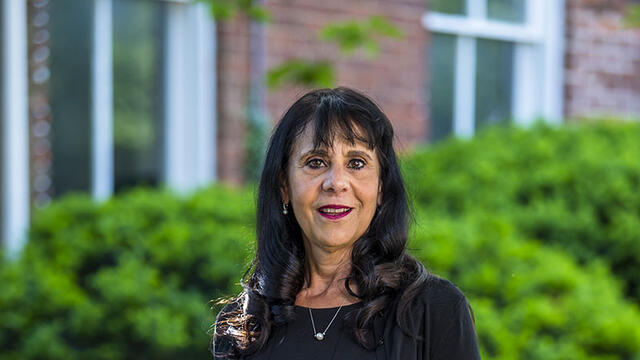Ukraine’s desire for democracy: perspective from a McDaniel political science professor
Christianna Leahy, professor and chair of the department of Political Science and International Studies, discusses the implications of Ukraine’s early battles for independence from Russia, especially in the Orange Revolution.

Christianna Leahy is a professor of Political Science and International Studies and chair or the Political Science Department at McDaniel. Her courses include topics in revolutionary movements, conflict resolution, peacekeeping, and international politics.
On March 23, Christianna N. Leahy, chair of the department of Political Science and International Studies, led a discussion on the war between Russia and Ukraine following a screening of the documentary “Orange Revolution” at the Carroll County Arts Council in Westminster, Maryland.
“Many people don’t realize how far back the current conflict goes,” says Leahy. “The Orange Revolution is emblematic of the resistance of the Ukrainian people today, since it shows the Ukrainian people’s commitment to freedom from Russian influence.”
The Ukrainian people are determined to have democracy. The Orange Revolution began as a mass peaceful protest in Kyiv’s Maidan Square in late 2004 after Soviet-backed Viktor Yanukovych was elected president of Ukraine. His opponent, Viktor Yushchenko, was considered the people’s candidate, and because of his popularity, Russian President Vladimir Putin’s operatives poisoned him with a nerve agent during his campaign. Despite the poison’s physical toll, he rallied his supporters. After extensive citizen protests for a fair election, they won the fight for two new rounds of voting. In the third round, Yanukovych was ousted, and Yushchenko was elected president of Ukraine — but it was a hard-won fight.
“From the beginning, Russia had no intention of allowing Ukraine to develop in the independent, democratic way it has tried to develop. The generation of people defending Ukraine now are the people and their kids who lived through the Orange Revolution,” says Leahy.
For Putin, the end justifies the means. The poisoning of Yushchenko echoes the 2020 poisoning of Russian activist Alexei Navalny, and Leahy notes that poisoning opponents with a nerve agent is a tactic typical of the Kremlin. Recently, on March 28, Russian oligarch Roman Abramovich and Ukrainian peace negotiators suffered a suspected poisoning in Kyiv.
“Putin is not beyond using tactical nuclear weapons as well as chemical weapons when he feels backed into a wall,” Leahy says. The implementation of widescale chemical or nuclear weapons would be a dire escalation in Russia’s ongoing invasion of Ukraine. It is also a possibility, following Putin’s threats of “consequences greater than any you have faced in history.”
“The irony is the success of the Ukrainian resistance to the Russian military is on the one hand good for holding off Russia’s complete control,” says Leahy, “but on the other hand it is making Putin more desperate.”
A unified Russia, or nothing. Putin’s current strategy appears aimed at an ideal, re-unified Russia, says Leahy, which at minimum includes Ukraine and Belarus, “but he underestimated the resistance of Ukraine.” She remembers taking Western Maryland College students on a January Term study trip to the Soviet Union while Mikhail Gorbachev was president. They visited the cities of Moscow and St. Petersburg in Russia, then traveled to Ukraine, Georgia, and Azerbaijan, and noticed their citizens’ sense of their distinct nations was clear.
“From the inception, those countries were not interested in being incorporated into the Soviet system, especially Ukraine, which suffered terribly under Soviet control,” says Leahy. Ukraine experienced extreme hardship during Stalin’s Red Famine in the 1930s, and that remains in Ukrainian memory, in addition to the more recent Russian attacks in the Donbas and the forceful annexation of Crimea.
Leahy adds that the toll on Russian citizens from President Putin’s attempt to invade Ukraine will also be significant, regardless of state suppression in the country. “Russians in Russia have been subjected to the same authoritarian regime and know the consequence of resistance to it,” she says. “An estimated 15,000 Russian soldiers have been killed so far, so that’s 15,000 Russian mothers that will soon know what has been happening in Ukraine and there will be a reaction to those deaths.”